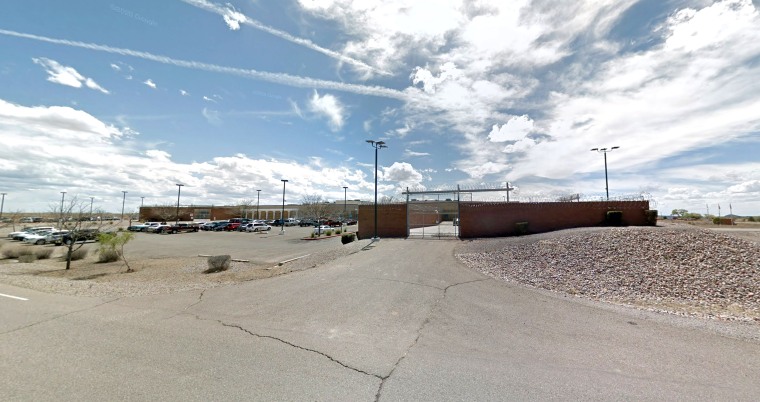Amanda Schottmuller sat quietly during her criminal court hearing on June 29, understanding little about what was happening. She didn’t know why a judge was trying to determine if she was dangerous.
“It didn’t make any sense,” Schottmuller, a 37-year-old former nurse who has struggled with depression, bipolar disorder and substance abuse for the past 10 years, later said. “I’ve never tried to harm anyone in my life.”
About two weeks earlier, police arrested Schottmuller for trespassing at a gas station in Edgewood, New Mexico, about 60 miles south of Santa Fe. She then allegedly kicked out the back window of a police car, trying to escape, so she was charged with destruction of property and resisting arrest. She also faced a burglary charge for breaking into a Walgreens a week earlier and allegedly stealing a Mountain Dew and three packs of cigarettes. She pleaded not guilty.
Though no one was hurt in these incidents, a Santa Fe County prosecutor sought to hold Schottmuller in jail without bond while she awaited trial, arguing to a judge that her erratic behavior made her a danger to the public.
Four years ago, state law would not have allowed prosecutors to request that Schottmuller be held without bond. But in 2016, New Mexico voters approved a constitutional amendment to almost entirely eliminate cash bail. The change was designed to prevent low-risk defendants from getting stuck in jail before trial just because they couldn’t pay. But in practice — because the new law also allowed judges to deny bail in felony cases for the most dangerous defendants, without clearly defining what it meant to be “dangerous” — public defenders and policy experts say it’s had the unintended consequence of keeping more defendants in jail without any option of pretrial release at all.
From 2015 to 2016 — prior to the elimination of cash bail — only eight defendants were held in jail without bond across four New Mexico counties, including Santa Fe County, according to a University of New Mexico study. This year, from January to mid-October, at least 30 defendants in Santa Fe County alone were held without bond, according to data obtained by NBC News. Those include people accused of murder, but also those charged with nonviolent crimes, such as burglary, driving while intoxicated and drug possession.
“When this was sold to the voters in 2016, it was promised that it would only be used to detain the worst of the worst,” said Jennifer Burrill, a supervising attorney in the state public defender office’s Santa Fe division. “Unfortunately, that's not how it's being utilized.”

Both prosecutors and public defenders have criticized the state’s bail changes for a lack of clarity. Public defenders say the rules give prosecutors and judges too much discretion, while some district attorneys argue the broad definitions do not do enough to ensure the detention of violent offenders.
It’s unclear whether the changes have shrunk the jail population in New Mexico — though some judges and state officials have said the new system is working, citing decreases in the use of cash bonds (which are now used only if a defendant is considered a flight risk).
Advocates for pretrial reforms and policy experts say New Mexico offers a cautionary tale to other states considering eliminating bail — particularly because of the growing roster of people charged with nonviolent crimes who are detained without an option for release.
Unless states create clear rules that prioritize releasing people from jail, “what you will see is judges default much of the way they did to setting bail in previous kinds of cases, and now just imposing preventative detention,” said Insha Rahman, vice president of advocacy and partnerships at the Vera Institute of Justice, a nonprofit research and policy organization that supports pretrial reforms.
For more of NBC News' in-depth reporting, download the NBC News app
At Schottmuller’s June hearing, Matthew Carlisle, her public defender, argued that she did not pose a threat.
“Do we lock them up because it's just easier by inflating dangerousness or do we set conditions of release that require her to take steps for sobriety and push her to seek help for her mental anguish?” he said during the court hearing, held virtually because of Covid-19 restrictions. “And I beg the court that it chooses the latter.”
But at the end of the 35-minute hearing, the judge sided with prosecutors, ordering that Schottmuller be held without bond.
What counts as ‘dangerous’?
Schottmuller said she became depressed in 2011, amid what she described as a stressful custody battle over one of her two children. Her family said she struggled with drug abuse as well, but had never hurt anyone.
Before this year, Schottmuller had little on her criminal record other than traffic tickets. In 2018, she was charged with forgery, but the charges were dismissed after she completed probation, court records show.
Early this spring, Schottmuller stopped taking her mental health medications, without which she was disoriented or confused, her father, Richard Roberts, said. On March 30, Schottmuller was arrested for damaging property at an Albuquerque bank, a misdemeanor that was later dismissed.
In April and May, police reports show that Schottmuller was suspected in more than a dozen incidents that ranged from shoplifting cigarettes and refusing to pull over for police to lighting a tree on fire in a grocery store parking lot and shooting at cars from her yard (she told police she was shooting at trash cans, according to court records). But she wasn’t charged in any of those incidents and said she has no recollection of them.
Prior to New Mexico’s bail changes, a defendant awaiting trial could only be held without bond if they were being tried for a capital case, if they had at least two prior felony convictions or if they had one prior felony conviction and their current offense involved a deadly weapon.
But under the new rules issued by the New Mexico Supreme Court after the 2016 vote, prosecutors can present a broader range of evidence during pretrial detention hearings, including previous criminal convictions, cases in which the defendant was suspected but not charged with a crime and the “history and characteristics of the defendant.”
During Schottmuller’s pretrial detention hearing in June, the prosecutor, Kent Wahlquist, deputy district attorney of the First Judicial District Attorney’s Office, detailed many of the incidents in which she was suspected to argue that she should be held in jail. “She is violent and causes damage, ignores police,” Wahlquist told the judge, according to hearing transcripts.
Carlisle, who has defended more than 50 clients in pretrial detention motions this year, says it’s problematic for prosecutors to base their arguments on unsubstantiated claims, such as incidents in which the defendant was not charged. “Now the floodgates are open for what’s considered evidence,” he said.
Dianna Luce, president of the New Mexico District Attorneys Association, said in an email that the new system places too heavy a burden on prosecutors to prove that someone is dangerous. Instead, she’d like to see rules that allow people charged with certain crimes, such as murder, to be automatically detained before trial unless defense attorneys can successfully argue that they’re not a threat.
“The new system has created a lot more work for district attorney offices and uncertainty for victims and families of victims,” Luce said in the email. She added that courts throughout the state have handled the pretrial detention hearings differently, issuing a wide variety of rulings for defendants with similar charges and criminal history.
‘She’s not some kind of monster’
Public defenders say judges in New Mexico rarely reverse decisions about pretrial detention, but in Schottmuller’s case, the judge said he would consider releasing her to house arrest if she received mental health treatment while in custody.
Schottmuller was transferred to a mental health facility in August after an evaluation requested by Carlisle found that she was not competent to stand trial. She spent about six weeks there before being brought back to jail. In October, a new evaluation found that her mental health had improved, and Carlisle returned to the judge to ask if Schottmuller could be placed on house arrest while awaiting trial. The judge agreed.
On Nov. 2, nearly five months after she was arrested, Schottmuller was released from jail and required to stay in her father’s home until trial.
In an email, Wahlquist, the prosecutor in Schottmuller’s case, said she is a good example of how the new bail system can protect the public while also helping those in need of assistance.
Roberts, Schottmuller’s father, said he’s glad to have his daughter home. While she was in jail, he felt powerless, unable to ensure she was taking her medication and unsure how she was doing.
“I could not imagine why she had earned a no bond,” Roberts, 63, said. “She's not some kind of monster. She didn't do some kind of vicious monster things that were going to hurt anybody.”
Schottmuller said other than the criminal case hanging over her, she’s in good spirits. She spends her days cleaning the house and cooking — Roberts said she makes the best spaghetti and meatballs — or relaxing on the front porch.
She still has trouble understanding why she was held without bond. Her biggest takeaway: “The legal system isn't equal for everybody.”

